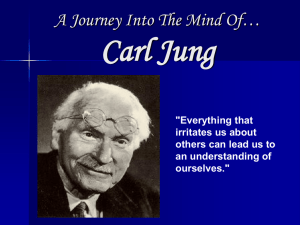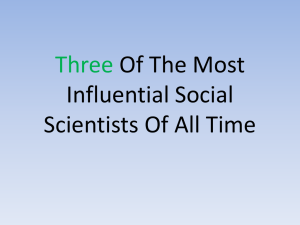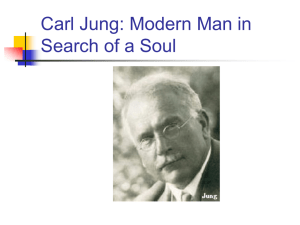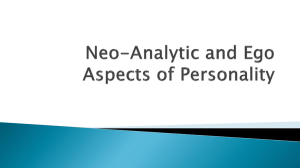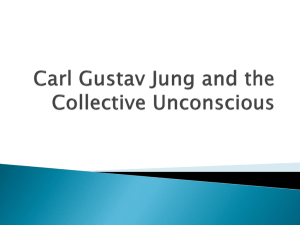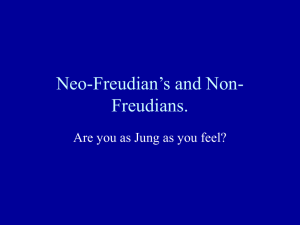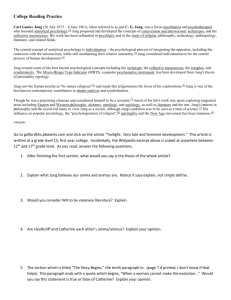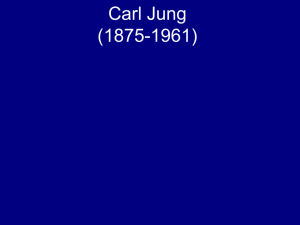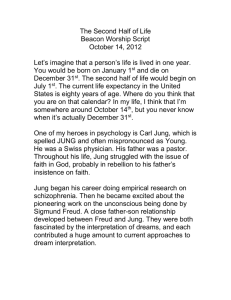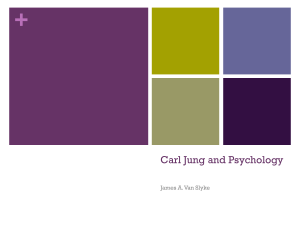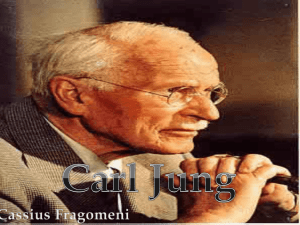Freudian, Jungian, and Cognitive Models of the Unconscious
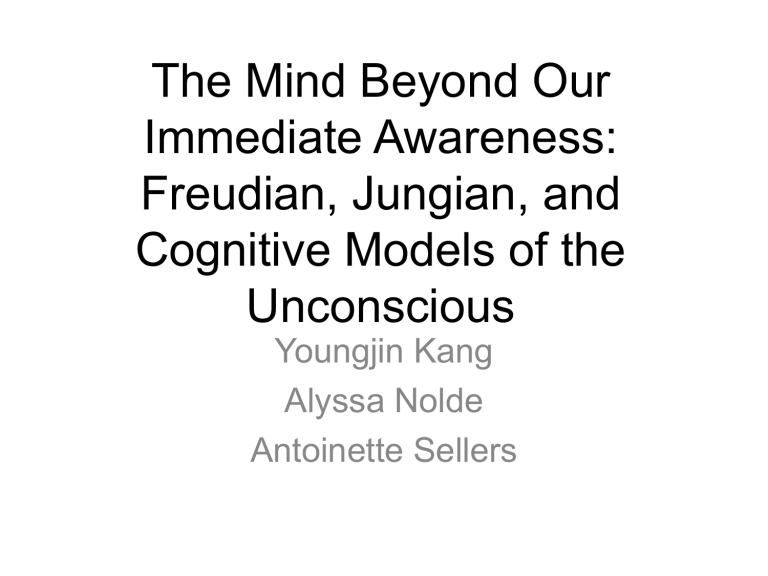
The Mind Beyond Our
Immediate Awareness:
Freudian, Jungian, and
Cognitive Models of the
Unconscious
Youngjin Kang
Alyssa Nolde
Antoinette Sellers
8. What role does Lorentz have in connecting ideas about the unconscious to biology?
• Lorenz: tied many animal behaviors to genetic predispositions
– Ex. Imprinting
• Emphasis on broadly innate patterns of behavior
– Jung= Humans
– Lorenz= Animals
8. Discuss the significance of
Gazzaniga’s observation.
• Stated that Freud and
Jung relied on models from the natural sciences of the time
– These models are NOT tied to specific data about the human brain
Thought
• Jung and Lorenz had similar ideas, but not at the same time
• Although Gazzaniga states that Jung did not base the data on data, Lorenz’s work provides some evidence (hard evidence) for Jung’s theories
9.Discuss how Freud’s theories relate to more modern understanding of brain function.
– Current understanding of brain function shows us that contrary to Freudian theory, aspects of cognition, the conscious, preconscious, and unconscious are associated with many brain regions, not just one.
9.Discuss how Freud’s theories relate to more modern understanding of brain function.
‘starts to break down under closer scrutiny,’ as the idea that certain drives are the basis for the unconscious has also outlived its usefulness
– It has also been ruled out that ‘immaculate perception’: accurate, if not exact, copies in the person’s memory of what happened in early childhood is a possibility
9.Discuss how Jung’s theories relate to more modern understanding of myths, although they may have parallels in other cultures, cannot with certainty claim that it is due to a general propensity of the human brain to produce beliefs with specific features.
Their occurrence would also have to express adaptations to certain conditions, conditions which may exist for long time periods without having to be timeless
9.Discuss how Jung’s theories relate to more modern understanding of brain function.
– Jung’s theory tends to ignore plasticity and adaptability of the human brain
– He also seems to assume that heritability can be separated from the environmental factors, a possibility that is rejected by contemporary geneticists
“Traditional Unconsciousness” vs. “Cognitive
Unconsciousness”
1. Traditional Investigation of unconsciousness leads to Dualistic Perspective of Mind vs. Body problems.
- Drive (sexual, etc.)
- Primitive urge (archetype)
- Instinct (id)
of animals….(but not of humans…..)
- these things exist in human mind, because human mind is such a thing. So, traditional investigation of unconsciousness relied on metaphoric premise of human mind. (e.g. human mind is the battleground of good vs. evil, humans vs. animals, civilized vs. primitive, etc. so, no need of data )
Continued
•
•
•
2.
Cognitive Unconsciousness (Lakoff & Johnson)
“most of our thought is unconscious, not in the
Freudian sense of being repressed, but in the sense that it operates beneath the level of cognitive awareness, inaccessible to consciousness and operating too quickly to be focused on” more automatic process than others.
- (1) Rapid Process : visual, auditory, and motor cognitive operation
(2) Spontaneous Organization : What is this? It may be Kantian perspective…?
10
Inductive Organization of Human Thought
1. Where a basic organization of abstract thinking come from?
According to Kant…. “ ……………… ”
- According to Lakoff & Johnson Body, Perception, and
Kinetic laws in Physical World. Called “embodied cognition.”
- (1) Spatial Relation - in, on, over, through, and under, etc.
(2) Concepts of bodily movements - grasp, pull, lift, tap, and punch, etc.
(3) Concepts indicating the structure of actions or events starting, stopping, resuming, continuing, and finishing
- These concepts are extended to any abstract thinking
“ unconsciously!
”.
Continued
• 2. Metaphor (Lakoff & Johnson)
“women fire and dangerous things” ???
- (1) Primary metaphors – Simultaneous
Experience
- (2) complex metaphor – Cultural Influences
“ Overall, according to Laffoff & Johnson, our thinking is basically more inductive than deductive (more modelic than syntactic), but this induction is so automatic, as deeply systematized because of countless experiences, so that it can be called virtually unconscious process .”
12
